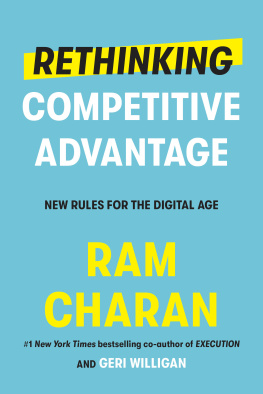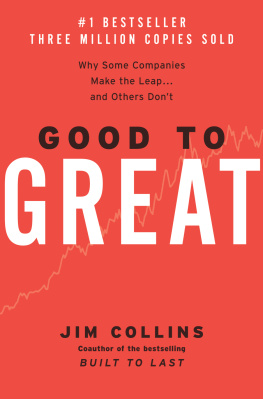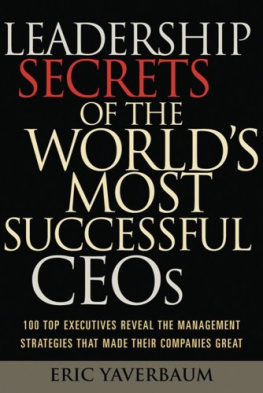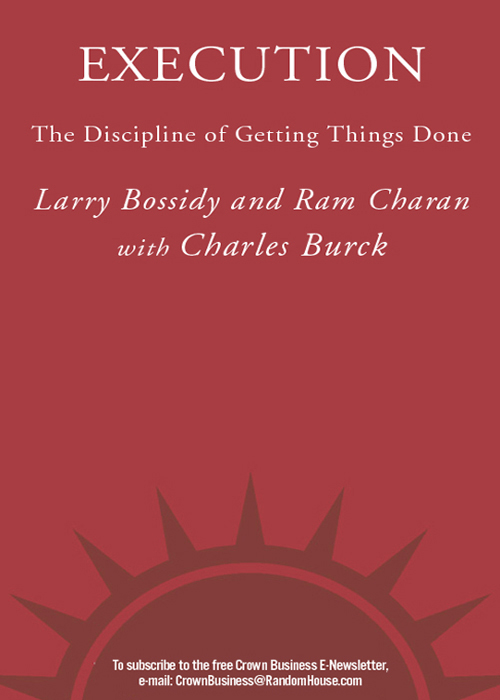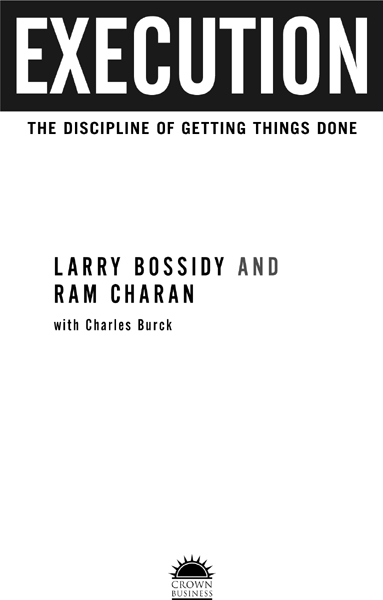ex-e-cu-tion (ek si kyoo shun), n.. The missing link.. The main reason companies fall short of their promises.. The gap between what a companys leaders want to achieve and the ability of their organizations to deliver it.. Not simply tactics, but a system of getting things done through questioning, analysis, and follow-through. A discipline for meshing strategy with reality, aligning people with goals, and achieving the results promised.. A central part of a companys strategy and its goals and the major job of any leader in business.. A discipline requiring a comprehensive understanding of a business, its people, and its environment.. The way to link the three core processes of any businessthe people process, the strategy, and the operating plantogether to get things done on time.. A method for success discovered and revealed in 2002 by Larry Bossidy and Ram Charan in Execution: The Discipline of Getting Things Done.
Previous books by Ram Charan
What the CEO Wants You to Know
Boards That Work
Every Business Is a Growth Business (coauthor)
The Leadership Pipeline (coauthor)
E-Board Strategies (coauthor)
Strategic Management: A Casebook in Policy and
Planning (coauthor)
To the hundreds of people who touched our business lives and influenced the thoughts articulated in this book. A special recognition to Jack Welch, who in our time was the predominant practitioner of getting things done.
Larry Bossidy
Ram Charan
CONTENTS
PART I:
1:
2:
PART II:
3:
4:
5:
PART III:
6:
7:
8:
9:
RESETTING EXECUTION FOR
A TIME OF CRISIS
Execution, when first published in 2002, was based on our observation that the discipline of getting things done was what differentiated companies that succeeded from those that just muddled through or failed.
Today we are mired in a deep global recession that is taking a tremendous toll on businesses, consumers, and governments. Everywhere there is a huge loss of confidence. Strategies and business models that once worked well no longer do so. Even when the recession ends the business and economic environment will not return to what we have come to regard as normal.
The world is experiencing a tectonic shiftthe global business environment is being reset. We now live in a world in which radical change can happen seemingly overnight, and in which many former givens will be in flux for a long time. That reality makes execution harder (not that its ever been easy), but also more important than ever before. Execution not only ensures efficient use of resources in a credit and cash-starved world, but also provides the feedback loop needed for the business to adjust to changesbig or smallin the external world. True, leaders must still conceive of a path forward, but execution is what drives the organization along that path and allows it to seize opportunities. And good execution not only will see a company through the tough times, but also significantly improve its chances for success as the environment continues to shift.
No one can predict precisely what the future holdswe will all have to deal with whatever is ahead when it happensbut consider some of the more profound changes that are likely to be in store:
Growth will be slower. The vast consumer market that is America may no longer be the principal global economic driver it has been, and countries intent on creating jobs for their people will be much slower to import our goods. During the early stages of recovery from the recession, credit will still be constrained, leverage restricted, and opportunities for profitable growth difficult to find. But the company that executes well will have the confidence, speed, and resources to move fast as new opportunities emerge. It will also have credibility as a partner, supplier, and investment of choice, compounding its advantage as it positions itself for growth.
Competition will be fiercer. In a slower-growth global economy everyone will be fighting harder and smarter to win market share. Each company will be searching for a new advantage, in the form of products, technologies, management, locations, prices, among many other variables. The margins for error are thinner, and flexibility and speed in assigning and re-assigning resources will make a huge difference in performance. Thats a lot to contend with and faulty execution in these basic performance nuts and bolts can lead to a death sentence, but thats not all. Stronger, faster companies can detect and pounce on opportunities, for instance, to take advantage of the downturn by snapping up assets at bargain prices and snatching market share out from under their competitors. Good execution reveals flaws in outmoded or wrong strategies sooner and allows time to change direction. Those who fail to see the errors in their strategies or who fail to execute the correct strategies quickly and effectively will face the fate that confronted GM, Chrysler, Bear Stearns, AIG, and Lehman Brothers as the economic and financial crises unfolded.
Governments around the world will take new roles in their economies and business environments. There will be a new regulatory environment and each government will carry it out in different ways, some as partners to business, others as adversaries. But there is also a trend toward more global rather than national regulation and that could present formidable obstacles given the various cultures and political systems involved in such a widespread effort. Even regulation at the national level will be heavily influenced by who the regulators are and what credibility they have. And there will invariably be calls for protectionism to shelter jobs and markets that suffer from intensifying competitive pressures. Companies that execute well will be more attractive as partners and suppliers to government bodies and better prepared to adapt to changing regulations.
Risk managementunderstanding and controlling risks at every level of the business, including political and global economic riskwill become a huge part of every leaders job. As of this writing there is considerable debate about whether the global economy will slide into deflation or if stimulus policies will touch off a new burst of inflation. Being prepared for either result is a fundamental tenet of risk management. But inflation or deflation can be forecast to some extent. The real risks are those that lie hidden beneath the veneer of business as usual. A decade ago credit default obligations or collateralized mortgage obligations mattered little, yet those instruments, highly touted a few years ago as a means to reduce risk, have been at the root of the current crisis. The lesson of the past two years is clear: Your strategy must incorporate a plan to deal with not only company and industry-specific risks, but also unknown risks, such as those in the global financial system. Execution is what gives you an edge in detecting new realities in the external environment as well as risks that are being introduced, perhaps inadvertantly, to your own operations.



